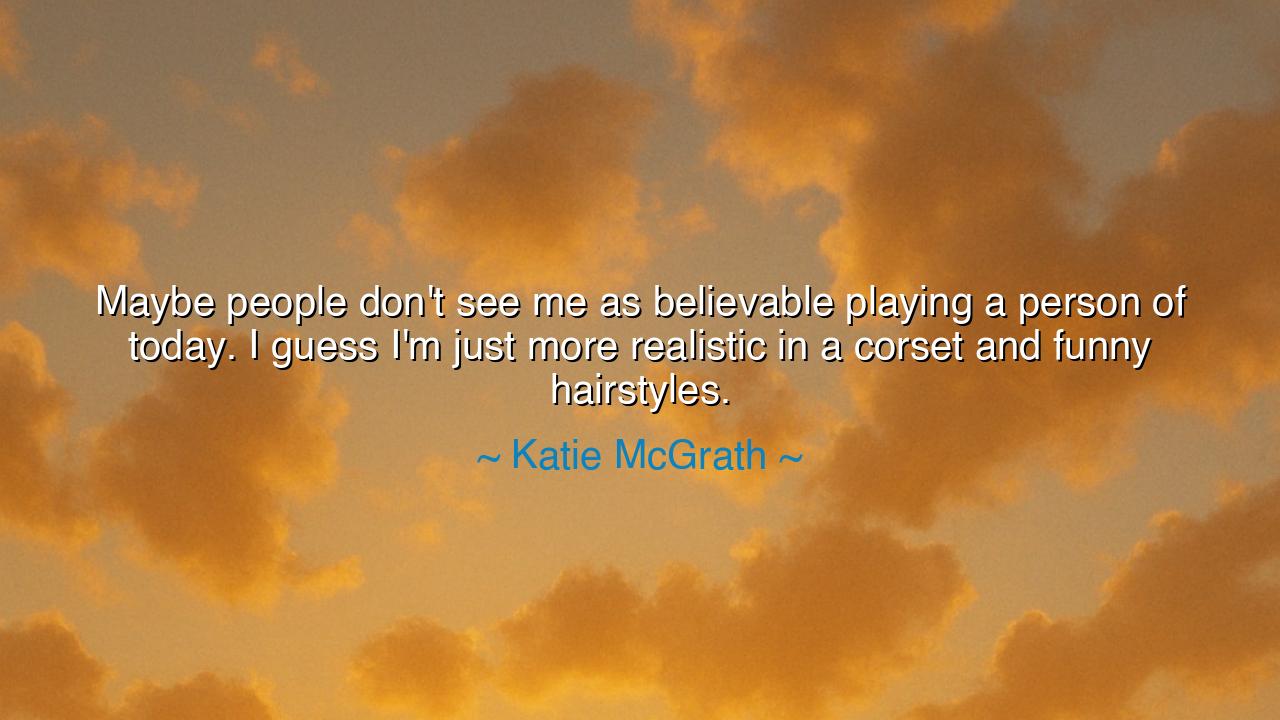
Maybe people don't see me as believable playing a person of
Maybe people don't see me as believable playing a person of today. I guess I'm just more realistic in a corset and funny hairstyles.






The words, “Maybe people don’t see me as believable playing a person of today. I guess I’m just more realistic in a corset and funny hairstyles,” come from Katie McGrath, the Irish actress known for her roles in historical and fantasy dramas such as Merlin and Dracula. On the surface, her words carry a note of gentle humor, but beneath them lies a deeper reflection on identity, perception, and the strange limits the world places upon the self. McGrath speaks with irony, yet her statement reveals a truth that reaches far beyond the stage and the screen—the truth that society often defines us by how it chooses to see us, rather than who we truly are.
In the tone of the ancients, we may hear in her words the eternal lament of the soul misunderstood by its age. She says she feels “more realistic in a corset,” yet we know this to be a paradox, for the corset, symbol of restriction, becomes here a symbol of freedom. When she wears the garments of another time, she is believed; when she stands in her own, she is doubted. Such is the fate of many who are born out of step with the world around them. The philosopher Heraclitus once said that “character is destiny,” but perhaps just as true is this: perception is fate. The image others make of us can shape our path as powerfully as the choices we make ourselves.
McGrath’s reflection also reveals the tyranny of type, the way the world clings to its categories. In every age, those who create are confined by the labels others assign them. The poet who writes one tragedy is called tragic forever. The artist who paints one saint is chained to holiness for life. And so McGrath, through no fault of her own, becomes the woman of another century—the face of medieval sorrow, the voice of ancient strength. Her tone is not bitter, but wistful. She knows that the world, in its longing for familiarity, often prefers the safety of what it already recognizes. Yet her words contain a subtle wisdom: by accepting this perception, she transforms it. The corset becomes not a prison, but a crown.
Consider the story of Vivien Leigh, the great actress who became immortal as Scarlett O’Hara in Gone with the Wind. The world saw her as the embodiment of Southern grace and fire, yet in her private life she longed to be seen as more than that single vision. When she played modern roles, critics dismissed her as fragile or ill-suited. Yet it was precisely that fragility that gave her performances their soul. Like McGrath, she learned that to be typecast is both a curse and a revelation—it forces one to master the space one is given until it becomes infinite. Greatness is not always in escaping the role, but in transcending it.
There is humor in McGrath’s words, but also humility. She laughs at herself, at the absurdity of being “realistic” only in a costume of another era. Yet this self-awareness is the mark of wisdom. The ancients taught that to know how others see you is the first step to mastering your destiny. She does not rebel against the image placed upon her; she acknowledges it, and through that acknowledgment, she gains power over it. Her humor disarms judgment, her grace transforms limitation into art. In her jest, there is courage: the courage to let the world laugh while she continues to create truth from illusion.
Her reflection also speaks to a broader truth about human identity. We are all, in some way, actors bound by perception. The world casts us in roles—friend, worker, leader, dreamer—and often, we wear them so long that we forget the person beneath. McGrath’s quote reminds us to be conscious of the masks we wear, and to remember that even if the world believes us to belong to another age, another idea, another identity, our essence remains our own. Sometimes, the most authentic thing we can do is to embrace the role we are given—and fill it so fully that it reveals something universal.
So, my child, take this lesson into your life: do not fear being misunderstood. The world may see you in one light, but your truth is larger than its lens. If you must wear the garments others hand you—be they literal or metaphorical—wear them with grace, and fill them with your own fire. Let the corset become your armor, the “funny hairstyle” your crown. As Katie McGrath teaches, you may not always choose how you are seen, but you can always choose how you shine.
And remember this final wisdom: the soul that knows how to laugh at its own confinement has already found freedom. The world may cast you as the hero of another time, but if you carry within you humor, intelligence, and heart, then every role you play—past, present, or future—will bear your truth. For even in a corset, the spirit can soar; even in the oldest costume, the modern heart of the artist still beats, eternal and free.






AAdministratorAdministrator
Welcome, honored guests. Please leave a comment, we will respond soon